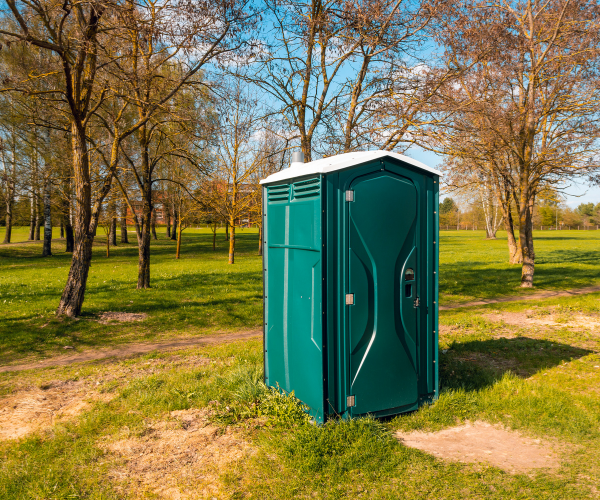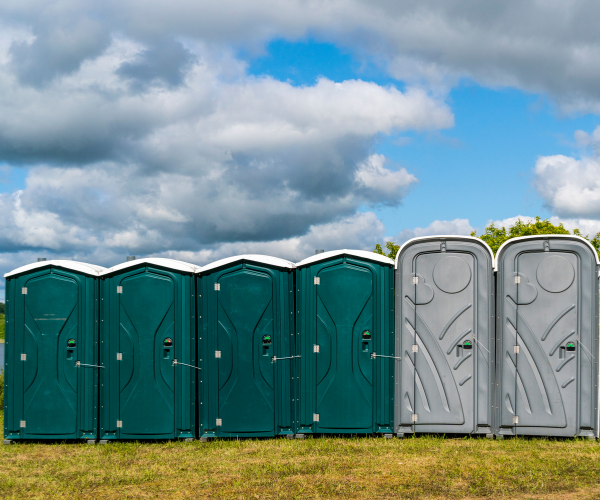Portable toilets offer a range of eco-friendly advantages that significantly contribute to sustainability. By design, portable toilets are self-contained units that do not require water for flushing, which means they help conserve thousands of gallons of water annually, compared to traditional restrooms. Additionally, they use non-hazardous chemicals for waste treatment, ensuring minimal environmental impact. The compact nature of these toilets means they occupy less space, and their mobility allows them to service areas where traditional infrastructure may not reach, minimizing construction-related disruptions to the environment. Portable toilets also help prevent water contamination, as they are designed to safely contain waste until it can be properly processed at a treatment plant. Moreover, companies providing portable toilets typically practice efficient waste management strategies, often working with local municipalities to ensure proper disposal. With many innovations focused on reducing carbon footprints, such as solar-powered units and biodegradable materials, portable toilets represent an increasingly sustainable choice for large events, construction sites, and public gatherings. This approach not only benefits the environment but also promotes awareness and encourages communities to adopt more sustainable practices during their events.

Portable Toilet Rentals in Bluefield, Virginia
Call today for a free quote (276) 277-9235
Portable Toilet
Fast, Easy, & 100% Free To Get Started
Over 20 Years of Experience
R&R Enterprises has proudly served the Bluefield community for over two decades, building strong relationships through dependable, high-quality services. Our deep local roots drive our commitment to excellence, ensuring customer satisfaction in each project.
Unmatched Quality Service
At R&R Enterprises, we build on a foundation of quality service. Our portable toilet units adhere to strict standards, delivering unmatched comfort and hygiene for every event.
Speedy Delivery Assurance
R&R Enterprises guarantees prompt delivery as promised. We focus on efficient service to meet your Portable Toilet requirements swiftly, boosting your event's success.
Reliable Portable Toilet Solutions in Bluefield
Call for a Free Quote Today
(276) 277-9235
R&R Enterprises offers premium portable toilet services in Bluefield, Virginia, known for its reliability and customer-centric approach. As a locally owned business, we pride ourselves on offering dependable service for construction sites, parties, festivals, and weddings. Serving not only Bluefield but also surrounding areas like Bland and Buchanan, our team is committed to delivering top-notch amenities tailored to any event. Clients trust us for our timely deliveries and well-maintained units. Our dedication to quality is supported by two decades of experience, ensuring every need is met with professionalism and care. Choose R&R Enterprises for a seamless, hassle-free experience that enhances your guests' comfort.


Our standard porta john rental units are durable and reliable for any commercial build site, housing development, public works project, or remodel job.Features include dome lighting, grated floors, and an “In-Use” locking mechanism for privacy and comfort. Regularly maintained, inspected, and cleaned by FusionSite at your location.

Developed as an alternative to full ADA-compliant restrooms, the Liberty is a spacious, wheelchair-accessible unit that can also be promoted as a family-sized restroom. Includes a patented flat-floor system for easy wheelchair access and maneuverability.Handrails, paper holder, and rotary latch are designed for simple, intuitive end-user operation.

Portable hand washing stations are essential for keeping your work site sanitary and clean. Features hands-free foot pumps, liquid soap, and paper towels.Perfect for job sites without water hookups, these units can handle hundreds of washes between services.
We Proudly Serve
Standard Portable Toilets
Our Standard Portable Toilets offer essential comfort and sanitation for events and job sites across Virginia.
High Rise Portable Toilets
Ideal for tall constructions, our High Rise Portable Toilets in Bluefield offer a practical sanitation solution.
Restroom Trailers
Experience luxury with our Restroom Trailers in Bluefield, providing upscale amenities for all occasions.
Plumbing
R&R Enterprises in Bluefield offers comprehensive plumbing services ensuring efficient system functionality.
Septic Tank Cleaning
Our Septic Tank Cleaning service in Virginia is comprehensive, maintaining peak operational efficiency.
Grease Trap Cleaning
For spotless systems, our Grease Trap Cleaning service in Bluefield keeps operations running smoothly.
Fencing & Barricades
R&R Enterprises provides robust Fencing & Barricades services for secured project sites across Virginia.
Residential Storage
Our Residential Storage services in Bluefield offer secure, accessible space solutions for any need.
Bluefield's Portable Toilet and More
Getting a quote and arranging delivery for portable toilets in Bluefield is incredibly easy and convenient with R&R Enterprises. Simply explore our user-friendly website, where you can click the 'Get A Quote' buttons placed throughout to initiate the process. Complete our simple form, which requires only your first and last name, phone number, and email, to receive a prompt response from our team. We prioritize your needs and provide detailed information regarding our services tailored to your specific requirements. From handling large events to smaller gatherings, we ensure that every aspect of your portable toilet rental is covered efficiently. Our team is dedicated to providing not only the necessary units but also personalized client care that guarantees satisfaction. By choosing R&R Enterprises, you enjoy stress-free planning and quick service tailored to fit your schedule.

Discover the advantages of choosing R&R Enterprises for portable toilet solutions in Bluefield. We focus on enhancing community events and local charm, offering clean, dependable services that amplify the welcoming atmosphere of Bluefield's famous gatherings. Whether it's the outdoor beauty of Lotito Park or the bustling energy of the annual Bluefield Coal Show, our portable toilets ensure any occasion runs smoothly. From festivals and weddings to sporting events, our units deliver exceptional guest experiences. Our dedication to quality distinguishes us, with services that prioritize convenience and dependability. Trust R&R Enterprises to elevate your event, ensuring the hygiene and comfort everyone expects.
R&R Enterprises is Bluefield's premier choice for portable toilets, combining local expertise with outstanding service. Our deep community connections allow us to provide customized sanitary solutions tailored to the specific needs of Bluefield.Choose us for unmatched reliability, backed by our reputation for maintaining clean, pristine facilities. Every event benefits from our meticulous attention to detail and our commitment to enhancing the atmosphere.We take pride in being more than just a service provider; we're trusted partners dedicated to supporting Bluefield's vibrant outdoor events and gatherings.
R&R Enterprises specializes in delivering fast and dependable Portable Toilet services, efficiently tackling urgent needs. Our meticulous process ensures prompt arrival and careful setup, customized for your event.Adapting to Bluefield's dynamic environment, our team excels with quick responses and dependable solutions. We address all inquiries with precision, expertly managing logistics for seamless execution.Rely on our efficiency to elevate your event with quality service that is both timely and hassle-free, establishing us as the preferred provider for prompt sanitary needs.
Explore Portable Toilet in Bluefield
Renting a portable toilet in Bluefield with R&R Enterprises is a straightforward and convenient process. Start by visiting our website, where you will find 'Get A Quote' buttons strategically located for easy access. Simply click on any of these buttons to initiate your rental process. You will be directed to fill out a user-friendly form located at both the top and bottom of the page. We ask for basic information including your first name, last name, phone number, and email to ensure we provide tailored service to your needs. Once submitted, our dedicated team will swiftly contact you with a quote and further details. We strive to make our services accessible and efficient, so you can focus on what matters most: organizing your event or project. Our team is always available to assist you with any questions you might have and to ensure the rental process goes as smoothly as possible. Choose R&R Enterprises for a hassle-free portable toilet rental experience in Bluefield, where customer satisfaction and quality service are our top priorities.
The typical delivery timeframe for portable toilet orders with R&R Enterprises is designed to accommodate our clients' schedules with efficiency and reliability. Delivery timelines can vary based on specific requirements and the nature of the event or project location, but our commitment is to offer prompt and professional service. Upon placing an order, our team coordinates to assess delivery needs, usually ensuring that units are dispatched within one to two business days for standard requests. For events requiring immediate attention, we offer expedited services to ensure timely setup, provided sufficient notice is given to arrange logistics. Our skilled team is dedicated to planning every detail, from transportation routes to onsite placement, ensuring seamless execution. Additionally, clients are encouraged to communicate any specific timing needs or restrictions, and our flexible service can be adjusted accordingly to meet those preferences. Our priority is to enhance the convenience of your event or project with punctual and dependable service that leaves no margin for error.
Yes, R&R Enterprises is equipped to provide portable toilet services for any type of event or construction project. Our extensive range of services includes accommodations for diverse occasions such as festivals, sporting events, weddings, corporate functions, and family reunions, ensuring that all specific needs are met. We offer a variety of sanitary solutions, including luxury restroom trailers for events demanding extra comfort and style. In addition to porta potties, we supply roll-off dumpsters, barricades, holding tanks, ADA-compliant units, portable sinks, and hand sanitizer stations. Our adaptable service model also addresses the needs of construction sites, offering durable and reliable units that withstand heavy use while maintaining high standards of hygiene. Whether a small local gathering or a large-scale construction project, R&R Enterprises ensures comprehensive support, tailored solutions, and an outstanding client experience that defines us as leaders in this field.

